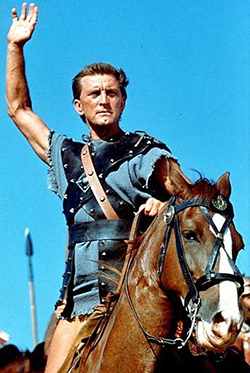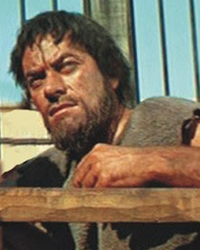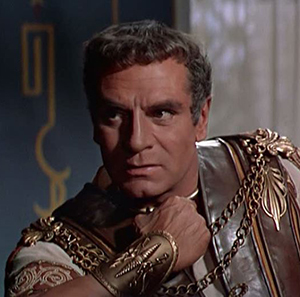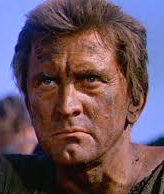Spartacus
vs.
Crassus... and Rome
The gladiator slave revolt!

He led a rebellion against mighty imperial Rome.
He led an army of slaves to victory after victory.
It became known as the third Servile War (from the Latin word for slave).
The year is 73 BC.
A revolt took place at the Capua gladiatorial school in southern Italy.
It began in the kitchen and involved about 70 slaves.
The man leading the revolt would be remembered for over 2,000 years.
His name... was Spartacus.
The escaped slaves plundered the immediate region and freed other slaves who joined them.
As time went on, some free, but very poor, citizens of Rome joined them.
Between 73 and 71 BC, this group of escaped slaves
grew into an army of over 120,000 men,
women and children.
Spartacus and his army of slaves would defeat
9 Roman armies.
The slaves knew their destiny if captured alive.
They would be crucified, a particularly painful
and slow death.
They had no choice but to fight each battle like it was their last day on Earth.
With each victory over the Romans, the slaves accumulated more weapons,
which they would train new freed slaves to use.
When they plundered a Roman ranch or estate, the spoils were split equally.
Forget about the Kirk Douglas version of Spartacus.
Most Roman soldiers taken prisoner were executed; some would be made slaves.
Sometimes they would be forced to fight each other,
just as Spartacus and his fellow gladiators had been forced to.
In the beginning, Rome underestimated the rebellion.
They sent a force of 3,000 soldiers to quell it.
But these were not seasoned, hard core Roman soldiers.
The main Roman armies weren't even in Italy. They were in foreign countries fighting foreign wars.
This small military contingent met the small army of Spartacus at Mt. Vesuvius.
(This is the same Vesuvius that would erupt
a hundred years later, burying the city of Pompeii).
Spartacus defeated them, even humiliating their commander.
In the 1960 Spartacus movie,
the
defeated commander says to Marcus Crassus (played by Laurence Olivier),
"But... they were just slaves..."
Surprisingly, very little is actually known about Spartacus.
It is believed that he was originally from Thrace,
which is near present day Bulgaria, but that is in question.
Some sources point to him having
served as a Roman soldier,
which would explain his military successes.
He succeeded in turning
slaves (and some poor free persons)
with no military experience into a great fighting force.
But it needs to be pointed out that there is no actual evidence that he was a former soldier.
And also, there is no actual evidence that he had a wife.
Spartacus was not trying to end slavery. That was part of life back then. It was accepted.
The small farms and ranches of soldiers, forced to be gone
for long periods, were being sold to
become part of large plantations.
Slaves were working
these large plantations.
Slavery became part of life in Italy.
The owners of these large estates were becoming very wealthy.
The slaves were having children. This resulted
in a very large slave population in Italy.
There were as many as two million slaves in Italy!
Many of the slaves were provided by the Cilician (present day Turkey) pirates.
The pirates would attack ships carrying grain (destination Rome)
and capture the crews.
They would sell these captives, as slaves.
Many other slaves were acquired as 'war booty' during Roman conquests.
Most of them began working the large plantations and farms of very wealthy Roman senators.
While these same senators were making money from the slave trade with the Cilician pirates,
officially,
the pirates were the enemy of Rome.
There were military attempts to destroy them (sometimes half-heartedly).
One of
the Roman commanders who tried and failed was the father of Marc Antony (of Cleopatra fame).

Actor John Ireland portrayed the true life character of Crixus.
He was one of the leaders, along with
Spartacus, in the slave revolt. He was killed in battle in 72 B.C.
Spartacus avenged the death of his friend by forcing captured
Roman soldiers to fight to the death.
The plan of Spartacus and his army was to get to the north end of Italy,
cross over the Alps,
and everyone would go home.
The slave army defeated every Roman army sent against them.
They had plundered estates and possibly took Roman women as
slaves.
The Roman legions had always plundered and looted. This was the way that it was.
The slave army did the
very same thing.
Finally, they reached
the northern part of Italy.
They had succeeded.
All they had to do was cross the Alps and return home.
But, something happened...
The vast majority of the slave army did not leave Italy. They stayed.
Undoubtedly, thousands of them did say their goodbyes
and began the walk back to Gaul, Germany and
wherever they had come from.
However, some of them had no homes to return to. They had been born into slavery in Italy.
Perhaps Spartacus decided that he liked being the commander of a successful army.
Perhaps he and the others may have realized that they had things better in Italy
than where they had come from,
many years before.
There is speculation that they had the idea of taking on Rome and freeing every slave.
However, once again, there is no actual evidence to support this thinking.
History doesn't show why they decided to stay, but they did.
The slave army turned and headed back. They remained in Italy.
Spartacus and his army of thousands knew what this meant.
They were declaring war... on Rome.


Spartacus
4K and Blu-ray, with extras!
Amazon

Sir Laurence Olivier as Crassus, in the 1960 Spartacus film.
Crassus!
Marcus Licinius Crassus was the wealthiest man in Rome.
He raised an army and set after Spartacus.
Crassus was a strict and ruthless military commander.
A Roman army that had previously been defeated by the forces of Spartacus was ordered to join Crassus.
The commander thought that he had a chance to defeat spartacus and he attacked.
The army was defeated again.
Crassus was outraged that his orders had been ignored.
He ordered that each tenth man that survived the battle
was to be executed.
This was not an unheard of thing in the Roman military. It was meant to establish discipline.
During the winter of 71 BC, Spartacus and his army of many thousands arrived at the southern end of Italy.
They had traveled over 700 miles from their point of possible escape at the north end of Italy.
Spartacus negotiated a plan with the Cilician pirates.
Large amounts of treasure were paid to them.
The plan was that the pirates would transport as many people as possible to the Island of Sicily (just a couple of miles off
the coast of Italy). There, Spartacus would lead a revolt and take over the Island. The pirates would have a safe
harbor and haven as a home base.
It is possible that this plan was conceived months earlier at the top of Italy,
when the decision was made not to escape to their home countries.
Regardless, the pirates betrayed Spartacus
and never showed up.
Crassus appeared instead.
He had an army of 32,000 men, not nearly as many as the slave army, but this was
a professional and well trained army.
Crassus ordered them to build a long 'wall' of earthworks (probably tree trunks and rocks).
The 'wall' was almost fifty miles long and stretched across that point of Italy.
It's difficult to imagine a 'wall' fifty miles long,
but the Romans were quite adept at building military defenses.
Spartacus and his huge army were trapped.
The great general Pompey was just returning from Spain. The Roman Senate offered him an additional
command to put an end to Spartacus once and for all.
In addition, another Roman army, with highly trained legionaries arrived by sea.
Crassus, understandably, wanted the glory of the victory.
The end was in sight.
Faced with three Roman armies converging on them, the army of Spartacus attacked the legions of Crassus.
The slave soldiers knew they would have to fight to the death, or be crucified.
This final battle, in 71 BC, ended the rebellion with the slave army being decisively defeated.
Spartacus and most of his army were killed in combat.
The body of Spartacus was never found,
and while this raises the interesting idea that maybe he had succeeded in escaping...
it can be rightly assumed that he did indeed die in combat.
Unlike the movie, the real Spartacus would have never allowed himself to be taken alive.
He would have fallen on his sword.
The slaves who chose to be captured did not identify his body.
The captured women and children went back to being slaves.
About 6,000 captured slaves were crucified along the Appian Way,
from Rome to Capua (where the rebellion had begun).
Their bodies were left there for a long time as a warning.
The warning worked.
There would never again be a slave rebellion as large and successful.
The first two Servile wars were much smaller and forgotten
within years,
but the one with Spartacus, the Third Servile War...

2000 years later,
the world still remembers...
Spartacus!
Here are some additional thoughts about the decision not to escape and the
Cilician pirates.





